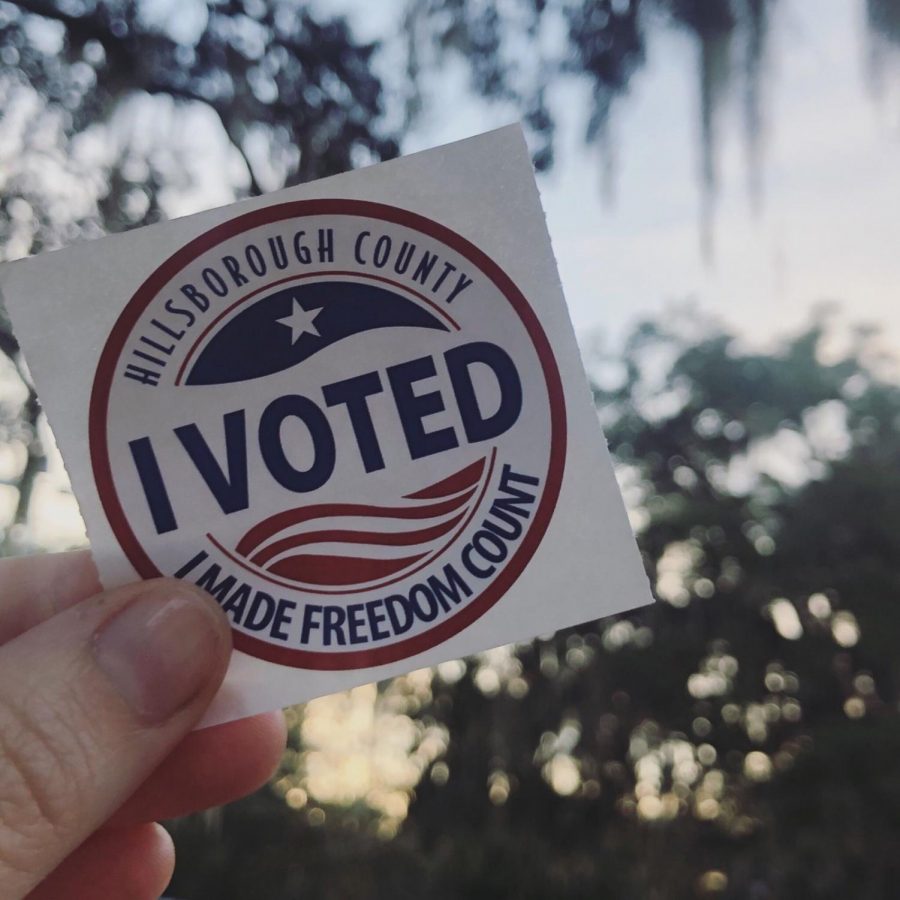Breaking down the Florida midterm results
Everything you need to know about the 2018 elections
November 7, 2018
The 2018 Florida Midterm elections were full of close, combative races, some of which are still too close to call. Voters also decided on a record-number of constitutional amendments. To find out more about what it all means, read our break-down of the results below.
Governor: Ron DeSantis (R)
The Trump-endorsed Desantis narrowly edged out a victory over Democratic candidate Andrew Gillum, winning by just 1% of the vote.
US Senator: Rick Scott (R)?
Rick Scott appears to have won against Democratic incumbent Bill Nelson, leading by 34,700 votes, but the race is so close that it has yet to be called definitely and a recount is likely.
Robinson Connections:
RHS alumnae Janet Cruz (D) defeated Senate District 18 incumbent Dana Young (R) by a slim margin, but the race was so close that a recount has been announced. Fellow alumnae Wesley Beggs (D), did not fare so well, loosing to Alan Maio (R) in her race for Sarasota County Commissioner and Flag football coach Greg Green lost his race for Judge Group 2 to Lisa Allen.
State Constitutional Amendments:
Voters decided upon the longest list of constitutional amendments seen in two decades this election. Many of the amendments proposed by Florida’s Constitutional Committee were controversial because of the way they “bundled” seemingly disparate proposals, but all of the amendments proposed with the exception of Amendment 1 passed (amendment 8 was removed from the ballot by the Supreme Court for its confusing wording).
Read on to find out more about what each of the amendments mean.
Amendment 2: Limit Property Tax Assessments
Non-homestead property taxes are now capped at 10%. Non-homestead properties refer to vacation homes, rental properties, vacant properties and commercial properties.
Amendment 3: Voter Control of Gambling
Voters will now control the authorization and expansion of gambling throughout Florida, taking that power away from the state legislature.
Amendment 4: Restores voting rights to most prior felons at the end of their sentences
Voting rights will now be restored to ex-felons (excepting murderers and sex offenders) upon the completion of their sentences. This could have a huge impact on future Florida elections because 1.5 million Floridians- approximately 10% of the state’s adult population- that were previously disenfranchised are now able to vote.
Amendment 5: Super-majority for Tax Increases
A two-thirds super-majority vote is now required in the Florida state legislature to pass any tax increases or repeal any exemption. As a result, just a third of the House or the Senate can block tax legislation, making it much harder to pass increases or repeals.
Amendment 6: Rights of Crime Victims and New Requirements for Judges
This amendment establishes a new victim bill of rights modeled after California’s Marsy’s Law, raises the mandatory retirement age for judges from 70 to 75 and requires that judges interpret statues and rules themselves rather than deferring to government agencies.
Amendment 7: Survivor’s Benefits and Requiring Votes on Higher Education Fees
This amendment provides survivors’ benefits to the families of military service members and first responders killed on duty. It also requires that state university trustees have a two-thirds majority to pass any increase in college fees, not including tuition.
Amendment 9: Ban Offshore Oil and Gas Drilling and Ban Vaping in Enclosed Indoor Workplaces Amendment
Both offshore oil and gas drilling and vaping in enclosed indoor workplaces are now banned in Florida. This is one of several controversial bundle amendments on the ballot to pass.
Amendment 10: State and Local Government of Structure and Operation
This amendment contains four proposals: state legislative sessions will now start in January rather than March in even-numbered years, a counter-terrorism office will now be created, the state veteran affairs and five-county level positions are now required to be elected. This last proposal impacts sheriffs, tax collectors, property appraisers, supervisors of elections and clerks of circuit court.
Amendment 11: Property Rights and Criminal Statue
This amendment removes obsolete language from the Constitution such as a provision outlawing “aliens ineligible for citizenship” from owning property, and repeals the state’s Savings Clause, which had prevented the retroactive application of criminal statues to a crime committed before that charge.
Amendment 12: Prohibits Lobbying and Abuse of Office
Public officials are now barred from lobbying both during their term and afterward for six years, and are forbidden to use their offices for personal gain.
Amendment 13: Ends Dog Racing
Commercial dog-racing will now be outlawed in Florida by 2020. There are almost a dozen dog-racing tracks throughout the state which will be impacted.
Hillsborough county referendums:
Hillsborough county had two referendums on the ballot, both of which passed. Read about the specifics below.
Raise sales tax by a cent to fund public transportation
This referendum raises the sales tax by a cent to fund public transportation services including the repair of roads, sidewalks and trails and improvements to public buses.
Raise sales tax by half cent to fund HCPS
This referendum raises sales tax by half a cent to fund Hillsborough County Public Schools’ capital budget. Uses for the money would include new air conditioners, maintenance, and new technology for schools around the county. Read more about it here.











